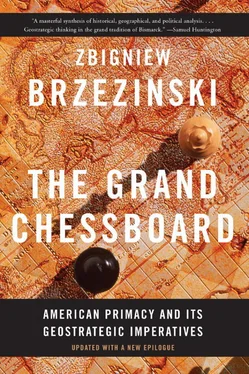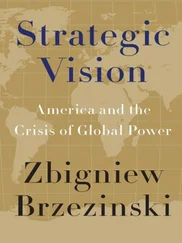A Greater China at some point will inevitably press for a resolution of the issue of Taiwan, but the degree of China’s inclusion in an increasingly binding set of international economic and political links may also have a positive impact on the nature of Chinese domestic politics. If China’s absorption of Hong Kong proves not to be repressive, Deng’s formula for Taiwan of “one country, two systems” can become redefined as “one country, several systems.” That might make reunification more acceptable to the parties concerned—which again reinforces the point that without some political evolution of China itself, a peaceful reconstitution of one China will not be possible.
In any case, for historic as well as geopolitical reasons, China should consider America its natural ally. Unlike Japan or Russia, America has never had any territorial designs on China; and, unlike Great Britain, it never humiliated China. Moreover, without a viable strategic consensus with America, China is not likely to be able to keep attracting the massive foreign investment so necessary to its economic growth and thus also to its attainment of regional preeminence. For the same reason, without an American-Chinese strategic accommodation as the eastern anchor of America’s involvement in Eurasia, America will not have a geostrategy for mainland Asia; and without a geostrategy for mainland Asia, America will not have a geostrategy for Eurasia. Thus for America, China’s regional power, co-opted into a wider framework of international cooperation, can be a vitally important geostrategic asset—in that regard coequally important with Europe and more weighty than Japan—in assuring Eurasia’s stability.
However, unlike the European situation, a democratic bridgehead on the eastern mainland will not emerge soon. That makes it all the more important that America’s efforts to nurture a deepening strategic relationship with China be based on the unambiguous acknowledgment that a democratic and economically successful Japan is America’s premier Pacific and key global partner. Although Japan cannot become a dominant Asian regional power, given the strong regional aversion it evokes, it can become a leading international one. Tokyo can carve out a globally influential role by cooperating closely with the United States regarding what might be called the new agenda of global concerns, while avoiding any futile and potentially counterproductive effort to become a regional power itself. The task of American statesmanship should hence be to steer Japan in that direction. An American-Japanese free trade agreement, creating a common economic space, would fortify the connection and promote the goal, and hence its utility should be jointly examined.
It is through a close political relationship with Japan that America will more safely be able to accommodate China’s regional aspirations, while opposing its more arbitrary manifestations. Only on that basis can an intricate three-way accommodation—one that involves America’s global power, China’s regional preeminence, and Japan’s international leadership—be contrived. However, that broad geostrategic accommodation could be undermined by an unwise expansion of American-Japanese military cooperation. Japan’s central role should not be that of America’s unsinkable aircraft carrier in the Far East, nor should it be America’s principal Asian military partner or a potential Asian regional power. Misguided efforts to promote any of the foregoing would serve to cut America off from the Asian mainland, to vitiate the prospects for reaching a strategic consensus with China, and thus to frustrate America’s capacity to consolidate stable geopolitical pluralism throughout Eurasia.
A TRANS-EURASIAN SECURITY SYSTEM
The stability of Eurasia’s geopolitical pluralism, precluding the appearance of a single dominant power, would be enhanced by the eventual emergence, perhaps sometime early in the next century, of a Trans-Eurasian Security System (TESS). Such a transcontinental security agreement should embrace an expanded NATO—connected by a cooperative charter with Russia—and China as well as Japan (which would still be connected to the United States by the bilateral security treaty). But to get there, NATO must first expand, while engaging Russia in a larger regional framework of security cooperation. In addition, the Americans and Japanese must closely consult and collaborate in setting in motion a triangular political-security dialogue in the Far East that engages China. Three-way American-Japanese-Chinese security talks could eventually involve more Asian participants and later lead to a dialogue between them and the Organization for Security and Cooperation in Europe. In turn, such a dialogue could pave the way for a series of conferences by all European and Asian states, thereby beginning the process of institutionalizing a transcontinental security system.
In time, a more formal structure could begin to take shape, prompting the emergence of a Trans-Eurasian Security System that for the first time would span the entire continent. The shaping of that system—defining its substance and then institutionalizing it—could become the major architectural initiative of the next decade, once the policies outlined earlier have created the necessary preconditions. Such a broad transcontinental security framework could also contain a standing security committee, composed of the major Eurasian entities, in order to enhance TESS’s ability to promote effective cooperation on issues critical to global stability. America, Europe, China, Japan, a confederated Russia, and India, as well as perhaps some other countries, might serve together as the core of such a more structured transcontinental system. The eventual emergence of TESS could gradually relieve America of some of its burdens, even while perpetuating its decisive role as Eurasia’s stabilizer and arbitrator.
BEYOND THE LAST GLOBAL SUPERPOWER
In the long run, global politics are bound to become increasingly uncongenial to the concentration of hegemonic power in the hands of a single state. Hence, America is not only the first, as well as the only, truly global superpower, but it is also likely to be the very last.
That is so not only because nation-states are gradually becoming increasingly permeable but also because knowledge as power is becoming more diffuse, more shared, and less constrained by national boundaries. Economic power is also likely to become more dispersed. In the years to come, no single power is likely to reach the level of 30 percent or so of the world’s GDP that America sustained throughout much of this century, not to speak of the 50 percent at which it crested in 1945. Some estimates suggest that by the end of this decade, America will still account for about 20 percent of global GDP, declining perhaps to about 10–15 percent by 2020 as other powers—Europe, China, Japan—increase their relative share to more or less the American level. But global economic preponderance by a single entity, of the sort that America attained in the course of this century, is unlikely, and that has obviously far-reaching military and political implications.
Moreover, the very multinational and exceptional character of American society has made it easier for America to universalize its hegemony without letting it appear to be a strictly national one. For example, an effort by China to seek global primacy would inevitably be viewed by others as an attempt to impose a national hegemony. To put it very simply, anyone can become an American, but only a Chinese can be Chinese—and that places an additional and significant barrier in the way of any essentially national global hegemony.
Accordingly, once American leadership begins to fade, America’s current global predominance is unlikely to be replicated by any single state. Thus, the key question for the future is “What will America bequeath to the world as the enduring legacy of its primacy?”
Читать дальше












